Burt A. The Evolution of the British Empire and Commonwealth From the American Revolution
Подождите немного. Документ загружается.

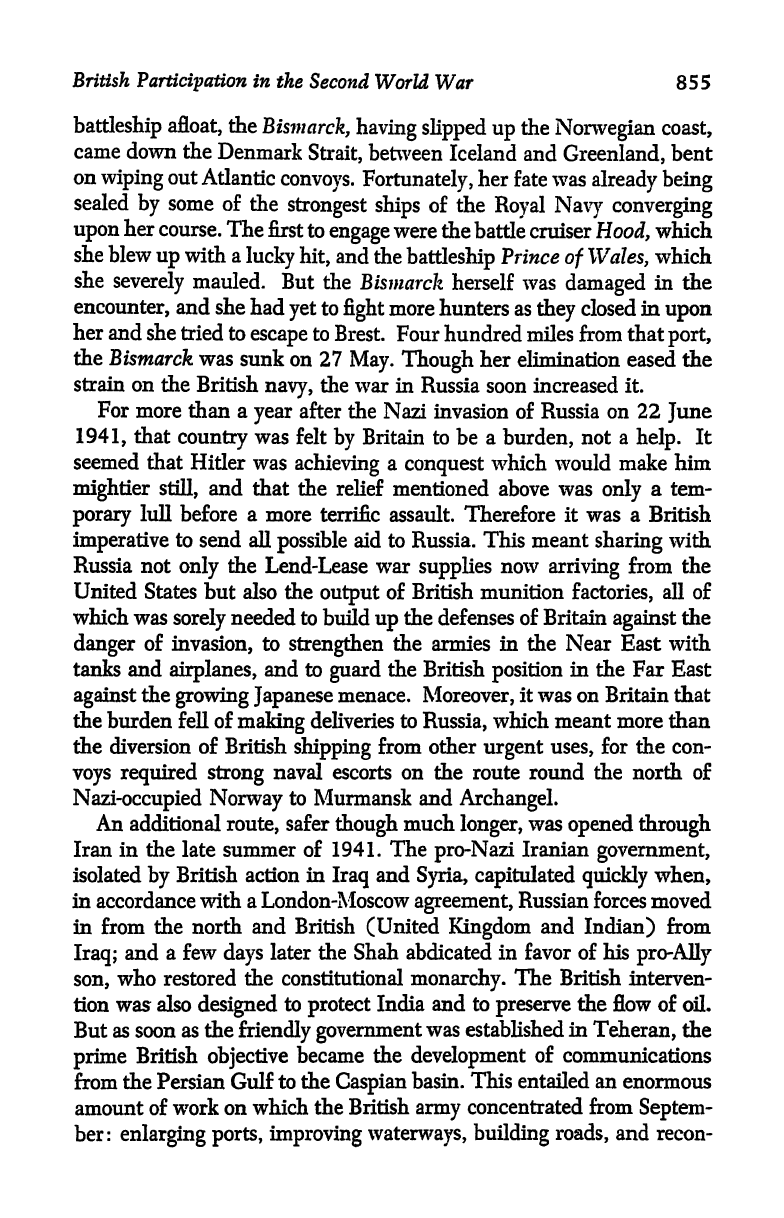
British
Participation
in
the
Second
World
War 855
battleship
afloat,
the
Bismarck,
having
slipped
up
the
Norwegian
coast,
came down
the
Denmark
Strait,
between
Iceland
and
Greenland,
bent
on
wiping
out
Atlantic
convoys.
Fortunately,
her
fate
was
already
being
sealed
by
some of
the
strongest
ships
of the
Royal
Navy converging
upon
her
course.
The
first
to
engage
were the battle cruiser
Hood,
which
she
blew
up
with
a
lucky
hit,
and the
battleship
Prince
of
Wales,
which
she
severely
mauled.
But the
Bismarck
herself
was
damaged
in the
encounter,
and she
had
yet
to
fight
more hunters
as
they
closed in
upon
her
and she
tried
to
escape
to
Brest. Four
hundred miles from
that
port,
the
Bismarck was
sunk
on 27
May.
Though
her elimination
eased
the
strain on
the
British
navy,
the war
in Russia
soon increased
it.
For
more
than
a
year
after the
Nazi invasion of
Russia on 22
June
1941,
that
country
was
felt
by
Britain
to
be
a
burden,
not a
help.
It
seemed that
Hitler
was
achieving
a
conquest
which would make
him
mightier
still,
and that the
relief
mentioned above was
only
a tem-
porary
lull before a
more terrific
assault.
Therefore it was a
British
imperative
to send
all
possible
aid
to Russia. This meant
sharing
with
Russia
not
only
the
Lend-Lease war
supplies
now
arriving
from
the
United States
but also
tie
output
of British munition
factories,
all of
which
was
sorely
needed to build
up
the defenses
of
Britain
against
the
danger
of
invasion,
to
strengthen
the
armies
in the Near
East
with
tanks and
airplanes,
and
to
guard
the British
position
in the Far
East
against
the
growing
Japanese
menace.
Moreover,
it
was on
Britain that
the
burden
fell of
making
deliveries
to
Russia,
which
meant more than
the diversion of British
shipping
from
other
urgent
uses,
for the con-
voys required strong
naval escorts on the
route round
the north
of
Nazi-occupied
Norway
to
Murmansk and
Archangel.
An additional
route,
safer
though
much
longer,
was
opened
through
Iran in the late summer of 1941.
The
pro-Nazi
Iranian
government,
isolated
by
British action
in
Iraq
and
Syria, capitulated quickly
when,
in
accordance
with a London-Moscow
agreement,
Russian
forces
moved
in from
the north and British
(United
Kingdom
and
Indian)
from
Iraq;
and
a
few
days
later the Shah abdicated
in
favor
of his
pro-Ally
son,
who
restored
the
constitutional
monarchy.
The British
interven-
tion was also
designed
to
protect
India and
to
preserve
the flow
of oil.
But
as
soon
as
the
friendly
government
was
established
in
Teheran,
the
prime
British
objective
became the
development
of
communications
from the Persian Gulf
to
the
Caspian
basin.
This
entailed an
enormous
amount
of
work
on
which the British
army
concentrated from
Septem-
ber:
enlarging
ports,
improving
waterways,
building
roads,
and
recon-

856
CHAPTER
FORTY:
structing
railways
an
enterprise
that
Americans
later took
over
and
completed.
It
is
beyond
the
scope
of this
chapter
to
follow
the
operations
of
war
in
the
Russian
theater.
The
British
had no
part
in the
fighting
there,
and
they
exercised
little influence
upon
it
except
by
what
they
had
un-
wittingly
done in
Greece
and
Crete
and
by
the
material aid
they
sent
to
Russia.
It is
well
to
remember, however,
that their
fighting
elsewhere
was
more or
less
aided
by
the titanic
conflict
on the
Russian
plains.
London
was
impatient
to clear the
enemy
out of North
Africa
in
1941
while
Hitler
was
absorbed
in
Russia,
where his armies
advanced
on
a
front of
twelve hundred miles
to a
depth
of
about
four
or
five
hundred
miles.
Rommel was
clinging
to the border of
Egypt,
a
thousand
desert
miles from his base at
Tripoli.
The British
opposing
him
were
inferior
in
tanks but
superior
in
die
air
and in
numbers;
and
Tobruk,
which
they
nourished
by
sea,
threatened
his
communications.
As
in-
surance
against
a
repetition
of the
June
fiasco,
headquarters
in
Cairo
clamored
for more tanks
and
got
them,
though
not so
many
as
desired.
Stalin
was
demanding
them
too,
and the drain
on
Britain
was
serious,
in view
of
a
possible
Russian
collapse.
"We
have to be at
concert
pitch
to
resist invasion
from
September
1,"
said
Churchill.
Two
other
worries
also beset
the commander
in
chief
of
the
Middle East.
5
He
feared a
German attack
through Turkey,
Syria,
and
Palestine,
which
the
home
government thought
less
likely;
and
along
with
that
government
he
was
embarrassed
by
the
insistence of the Australian
government,
for
domes-
tic
political
reasons,
upon
the
withdrawal of
the
Australian
division
from
Tobruk.
London
pressed
for
a
September
offensive;
Cairo
said
that
was
impossible
and
proposed
postponement
until
November,
to
which
Churchill
reluctantly
agreed.
The
delay
benefited
Rommel,
despite
the
British
destruction of a
large proportion
6
of
the
supplies
and
reinforcements
being
sent
to him.
5
Churchill
said
he "had
always
felt that
the
name
'Middle
East
1
for
Egypt,
the
Levant,
Syria,
and
Turkey
was ill-chosen.
This was the
Near
East.
Persia and
Iraq
were the
Middle
East;
India, Burma,
and
Malaya
the
East;
and
China
and
Japan
the
Far
East."
In
August
1942 he
proposed
"that
the
Middle
East
Command
shall
be
reorganized
into
two
separate
Commands,
namely:
(a)
'Near
East
Command,
1
comprising
Egypt,
Palestine,
and
Syria,
with its centre
in
Cairo,
and
(b)
'Middle
East
Command/
comprising
Persia
and
Iraq,
with
its centre
in
Basra
or
Baghdad."
The
war
cabinet
objected
to the
change
lest
it
cause
"confusion and
misrepresentation,"
and
he
agreed.
Churchill,
The Second
World
War,
IV,
460-63.
6
One third
in
August
and
nearly
two
thirds in
October,
on
the
passage
across die
Mediterranean,
which
was
exposed
by
the
transfer
of the
German
air
force
from
Sicily
to
the
Russian front
and
by
the
paralysis
of
the
Italian
fleet
for
lack
of oil
withheld
by
Hitler for
his
machines
in
Russia.
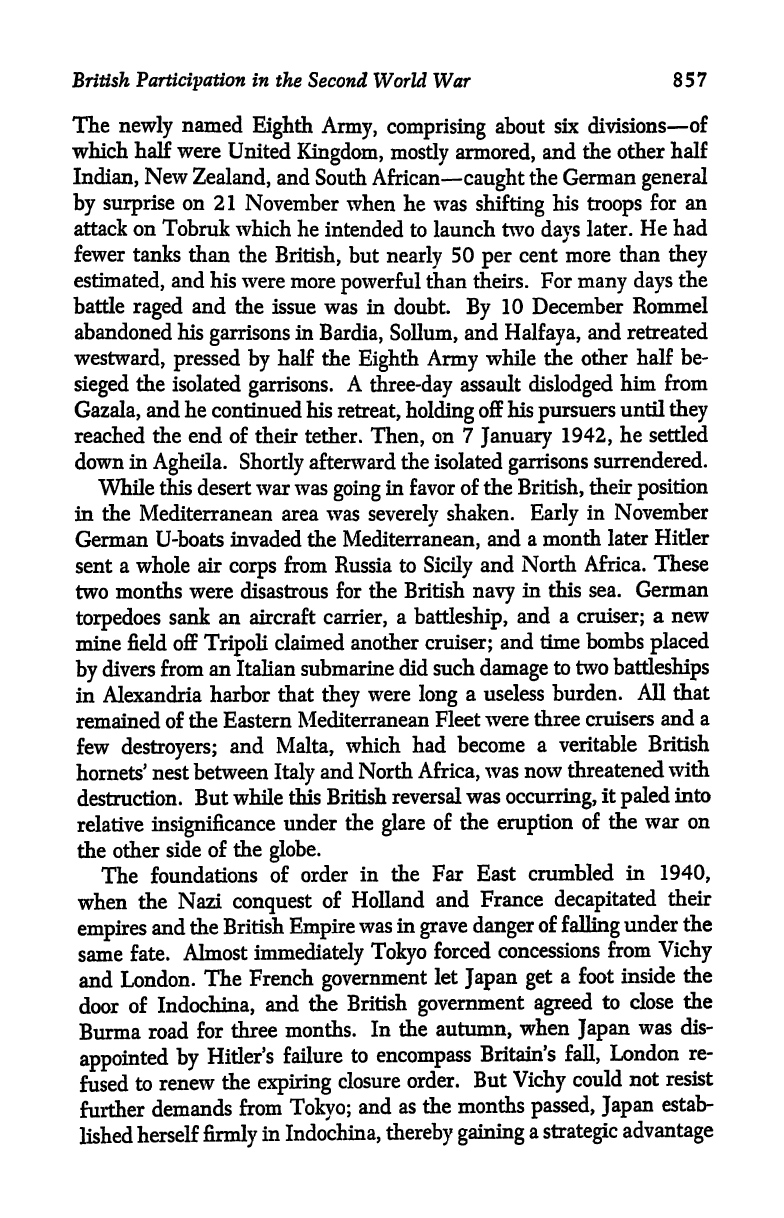
British
Participation
in
the Second
World War
857
The
newly
named
Eighth
Army,
comprising
about
six divisions
of
which
half were
United
Kingdom, mostly
armored,
and
the other
half
Indian,
New
Zealand,
and
South African
caught
the
German
general
by
surprise
on 21
November
when
he was
shifting
his
troops
for
an
attack on
Tobruk
which he
intended to launch
two
days
later.
He
had
fewer
tanks
than
the
British,
but
nearly
50
per
cent
more
than
they
estimated,
and his
were more
powerful
than
theirs. For
many
days
the
battle
raged
and the
issue
was in
doubt.
By
10 December
Rommel
abandoned his
garrisons
in
Bardia,
Sollum,
and
Halfaya,
and
retreated
westward,
pressed by
half the
Eighth
Army
while
the other
half be-
sieged
the
isolated
garrisons.
A
three-day
assault
dislodged
him
from
Gazala,
and he
continued
his
retreat,
holding
off
his
pursuers
until
they
reached the
end
of their tether.
Then,
on
7
January
1942,
he
settled
down
in
Agheila.
Shortly
afterward the
isolated
garrisons
surrendered.
While this
desert
war was
going
in favor of
the
British,
their
position
in
the Mediterranean area
was
severely
shaken.
Early
in November
German
U-boats
invaded
the
Mediterranean,
and
a month
later
Hitler
sent
a
whole
air
corps
from Russia
to
Sicily
and
North
Africa.
These
two
months
were
disastrous
for
the British
navy
in this
sea. German
torpedoes
sank
an aircraft
carrier,
a
battleship,
and
a
cruiser;
a
new
mine
field off
Tripoli
claimed
another
cruiser;
and
time
bombs
placed
by
divers
from
an
Italian
submarine
did
such
damage
to two
battleships
in
Alexandria
harbor
that
they
were
long
a
useless
burden.
All
that
remained
of
the Eastern
Mediterranean
Fleet
were
three
cruisers
and
a
few
destroyers;
and
Malta,
which
had
become
a veritable
British
hornets'
nest
between
Italy
and North
Africa,
was now
threatened
with
destruction.
But while
this British
reversal
was
occurring,
it
paled
into
relative
insignificance
under
the
glare
of the
eruption
of the
war
on
the
other
side
of
the
globe.
The
foundations
of
order
in
the Far
East
crumbled
in
1940,
when
the
Nazi
conquest
of
Holland
and
France
decapitated
their
empires
and
the
British
Empire
was in
grave
danger
of
falling
under
the
same
fate.
Almost
immediately
Tokyo
forced
concessions
from
Vichy
and
London.
The
French
government
let
Japan
get
a
foot
inside
the
door
of
Indochina,
and
the
British
government
agreed
to
close
the
Burma
road
for
three
months.
In the
autumn,
when
Japan
was dis-
appointed
by
Hitler's
failure
to
encompass
Britain's
fall,
London
re-
fused
to
renew
the
expiring
closure
order.
But
Vichy
could
not
resist
further
demands
from
Tokyo;
and
as the
months
passed,
Japan
estab-
lished
herself
firmly
in
Indochina,
thereby gaining
a
strategic
advantage
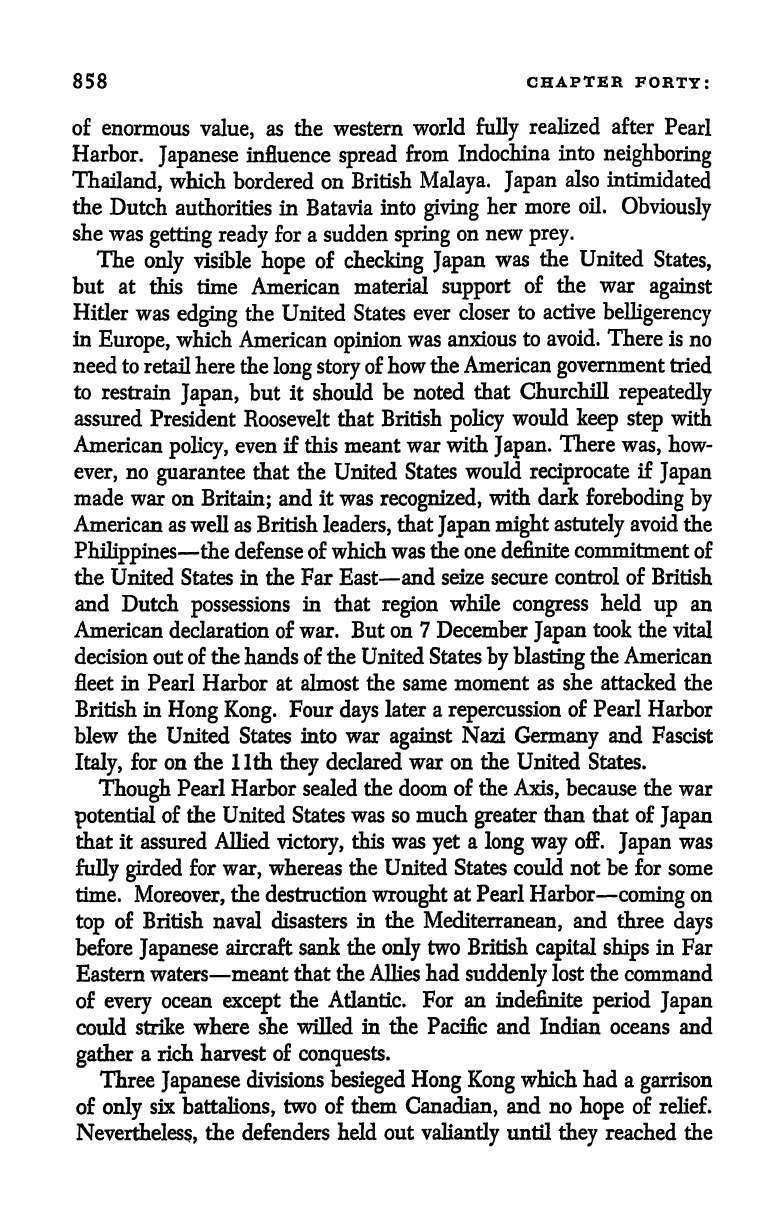
858
CHAPTER
FORTY:
of
enormous
value,
as the
western
world
fully
realized after
Pearl
Harbor.
Japanese
influence
spread
from
Indochina
into
neighboring
Thailand,
which
bordered
on
British
Malaya.
Japan
also
intimidated
the
Dutch
authorities
in
Batavia
into
giving
her
more
oil.
Obviously
she
was
getting
ready
for
a sudden
spring
on
new
prey.
The
only
visible
hope
of
checking
Japan
was
the
United
States,
but
at
this time
American
material
support
of
the
war
against
Hitler
was
edging
the United
States
ever
closer
to
active
belligerency
in
Europe,
which American
opinion
was
anxious
to avoid. There is
no
need to
retail
here
the
long
story
of
how
the
American
government
tried
to
restrain
Japan,
but it
should
be
noted
that
Churchill
repeatedly
assured
President
Roosevelt
that British
policy
would
keep
step
with
American
policy,
even if
this meant
war
with
Japan.
There
was,
how-
ever,
no
guarantee
that
the
United
States
would
reciprocate
if
Japan
made
war on
Britain;
and
it was
recognized,
with
dark
foreboding by
American as
well as British
leaders,
that
Japan
might
astutely
avoid
the
Philippines
tie
defense of
which
was
the
one
definite
commitment
of
the United States
in the Far
East and seize
secure control
of
British
and Dutch
possessions
in
that
region
while
congress
held
up
an
American declaration
of
war.
But
on
7
December
Japan
took the
vital
decision out of the hands of
the United States
by
blasting
the
American
fleet
in
Pearl
Harbor
at
almost
the
same
moment
as she attacked
the
British in
Hong Kong.
Four
days
later a
repercussion
of
Pearl
Harbor
blew
the
United
States
into
war
against
Nazi
Germany
and
Fascist
Italy,
for
on
the
1 1th
they
declared
war on the United States.
Though
Pearl Harbor sealed the
doom of the
Axis,
because the
war
potential
of the United States
was so
much
greater
than that of
Japan
that it assured Allied
victory,
this was
yet
a
long
way
off.
Japan
was
fully
girded
for
wax,
whereas the United States could not
be
for some
time.
Moreover,
the
destruction
wrought
at
Pearl Harbor
coming
on
top
of British naval
disasters
in
the
Mediterranean,
and
three
days
before
Japanese
aircraft
sank the
only
two British
capital
ships
in Far
Eastern
waters meant
that tie
Allies had
suddenly
lost the
command
of
every
ocean
except
the
Atlantic.
For an indefinite
period Japan
could
strike
where
she willed
in
the Pacific and
Indian oceans
and
gather
a
rich
harvest
of
conquests.
Three
Japanese
divisions
besieged Hong Kong
which
had a
garrison
of
only
six
battalions,
two of them
Canadian,
and
no
hope
of
relief.
Nevertheless,
the defenders held
out
valiantly
until
they
reached
the
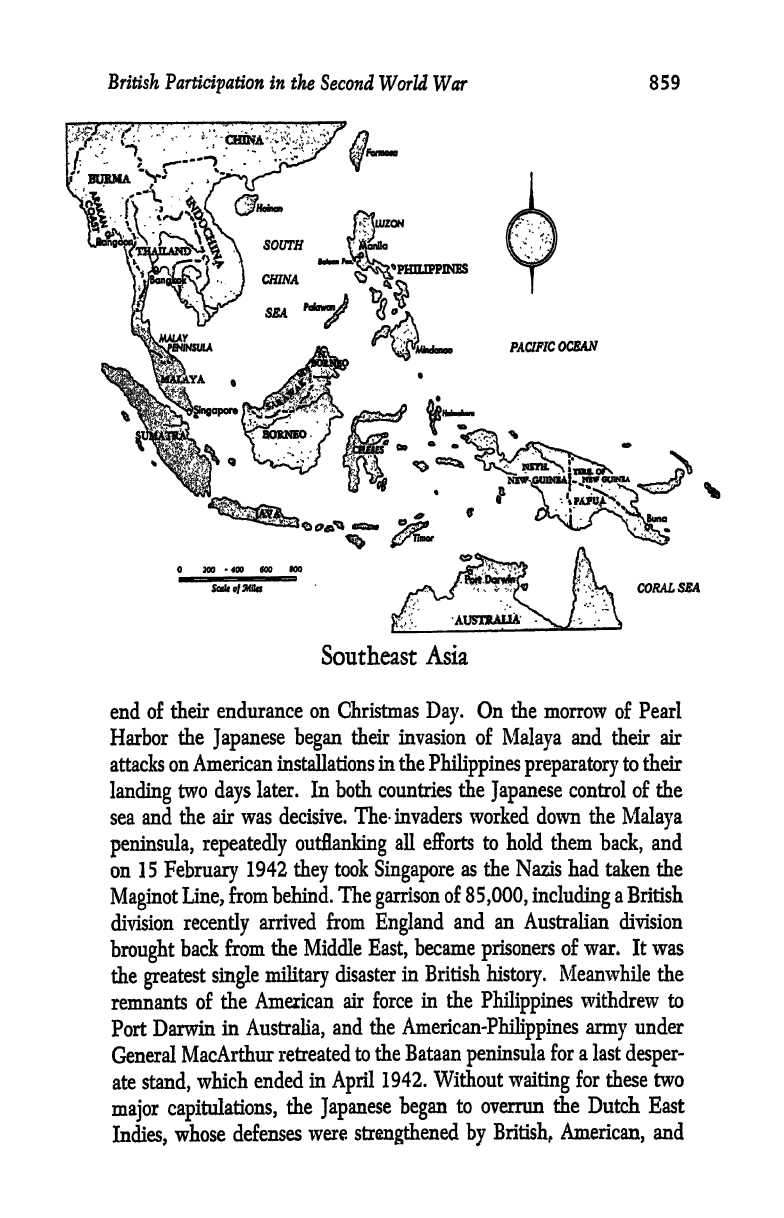
British
Participation
in
the
Second
World
War
859
CORAL
SEA
Southeast
Asia
end
of their
endurance
on
Christmas
Day.
On the morrow
of
Pearl
Harbor
the
Japanese began
their invasion of
Malaya
and their air
attacks
on
American installations
in the
Philippines preparatory
to
their
landing
two
days
later. In
both countries the
Japanese
control of
the
sea
and
the
air
was decisive.
The- invaders worked down the
Malaya
peninsula,
repeatedly
outflanking
all efforts to hold
them
back,
and
on
15
February
1942
they
took
Singapore
as the Nazis had taken the
Maginot
Line,
from behind.
The
garrison
of
85,000,
including
a British
division
recently
arrived
from
England
and
an Australian division
brought
back
from
the Middle
East,
became
prisoners
of
war.
It was
the
greatest
single
military
disaster
in British
history.
Meanwhile the
remnants
of
the
American
air force
in
the
Philippines
withdrew to
Port
Darwin
in
Australia,
and the
American-Philippines
army
under
General
MacArthur
retreated
to
the Bataan
peninsula
for
a
last
desper-
ate
stand,
which
ended
in
April
1942.
Without
waiting
for these
two
major
capitulations,
the
Japanese
began
to overrun
the
Dutch
East
Indies,
whose
defenses
were
strengthened
by
British,
American,
and
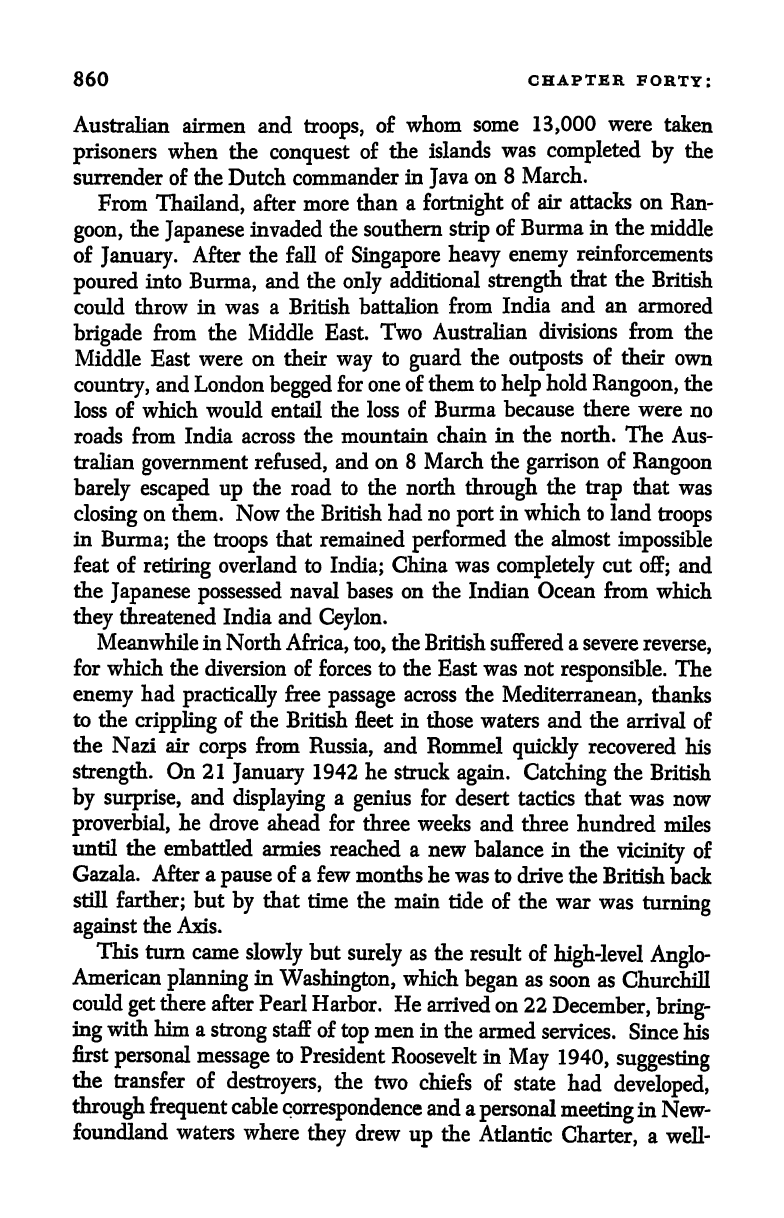
860
CHAPTER
FORTY:
Australian
airmen
and
troops,
of
whom
some
13,000
were
taken
prisoners
when the
conquest
of
the
islands
was
completed by
the
surrender
of
the Dutch commander
in
Java
on
8
March.
From
Thailand,
after
more
than
a
fortnight
of
air attacks
on
Ran-
goon,
the
Japanese
invaded
the
southern
strip
of
Burma in the
middle
of
January.
After the fall
of
Singapore
heavy
enemy
reinforcements
poured
into
Burma,
and
the
only
additional
strength
that the
British
could throw
in was
a
British battalion
from
India
and
an
armored
brigade
from the
Middle East.
Two
Australian
divisions from
the
Middle East
were on
their
way
to
guard
the
outposts
of
their
own
country,
and London
begged
for
one
of
them
to
help
hold
Rangoon,
the
loss
of
which
would
entail
the loss of
Burma
because
there
were
no
roads from
India across the
mountain
chain
in
the
north.
The
Aus-
tralian
government
refused,
and on 8
March
the
garrison
of
Rangoon
barely
escaped up
the road
to the north
through
the
trap
that
was
closing
on them. Now
the British had
no
port
in which to
land
troops
in
Burma;
the
troops
that remained
performed
the almost
impossible
feat of
retiring
overland to
India;
China was
completely
cut
off;
and
the
Japanese
possessed
naval bases on
the
Indian
Ocean
from
which
they
threatened
India
and
Ceylon.
Meanwhile in North
Africa, too,
the
British
suffered
a
severe
reverse,
for which the
diversion of forces to the East
was
not
responsible.
The
enemy
had
practically
free
passage
across the
Mediterranean,
thanks
to the
crippling
of the British
fleet in those waters
and
the
arrival
of
the Nazi air
corps
from
Russia,
and
Rommel
quickly
recovered
his
strength.
On 21
January
1942 he
struck
again.
Catching
the
British
by
surprise,
and
displaying
a
genius
for desert tactics that
was
now
proverbial,
he drove
ahead
for three weeks
and three
hundred
miles
until
the
embattled
armies
reached a new
balance in
the
vicinity
of
Gazala.
After
a
pause
of a few
months he
was to drive
the
British back
still
farther;
but
by
that
time the main
tide
of the war
was
turning
against
the
Axis.
This
turn
came
slowly
but
surely
as
the
result of
high-level
Anglo-
American
planning
in
Washington,
which
began
as
soon
as
Churchill
could
get
there
after
Pearl
Harbor. He
arrived on 22
December,
bring-
ing
with
him a
strong
staff
of
top
men
in
the
armed
services.
Since
his
first
personal
message
to
President
Roosevelt
in
May
1940,
suggesting
the
transfer
of
destroyers,
the
two
chiefs
of
state
had
developed,
through frequent
cable
correspondence
and a
personal
meeting
in New-
foundland
waters
where
they
drew
up
the
Atlantic
Charter,
a well-
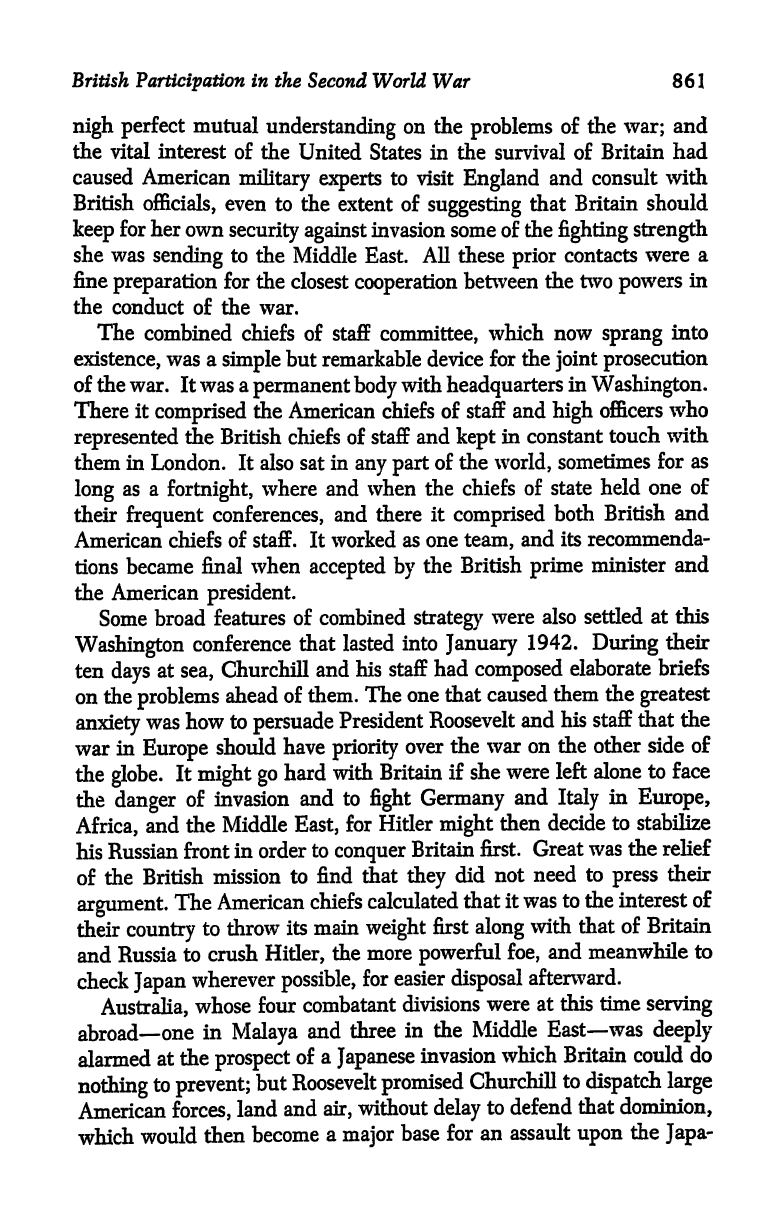
British
Participation
in
the
Second
World
War
86
1
nigh
perfect
mutual
understanding
on
the
problems
of the
war;
and
the vital
interest of
the
United States
in the
survival of
Britain
had
caused
American
military experts
to visit
England
and consult
with
British
officials,
even to
the extent of
suggesting
that
Britain
should
keep
for her
own
security
against
invasion
some
of
the
fighting
strength
she
was
sending
to
the Middle
East.
All
these
prior
contacts
were
a
fine
preparation
for
the
closest
cooperation
between
the two
powers
in
the
conduct
of
the
war.
The
combined chiefs
of
staff
committee,
which now
sprang
into
existence,
was a
simple
but
remarkable device
for
the
joint prosecution
of the war.
It was
a
permanent body
with
headquarters
in
Washington.
There
it
comprised
the American
chiefs
of
staff and
high
officers
who
represented
the British chiefs of
staff
and
kept
in
constant
touch
with
them in
London. It also sat
in
any
part
of
the
world,
sometimes
for
as
long
as
a
fortnight,
where and
when the chiefs
of
state
held one
of
their
frequent
conferences,
and there
it
comprised
both
British and
American chiefs
of staff. It worked
as
one
team,
and
its recommenda-
tions
became
final
when
accepted
by
the
British
prime
minister
and
the American
president.
Some
broad
features
of
combined
strategy
were
also
settled
at this
Washington
conference
that lasted
into
January
1942.
During
their
ten
days
at
sea,
Churchill
and his
staff had
composed
elaborate
briefs
on
the
problems
ahead of
them. The
one that caused
them the
greatest
anxiety
was how
to
persuade
President
Roosevelt
and
his staff that the
war
in
Europe
should
have
priority
over
the war on
the other side of
the
globe.
It
might go
hard
with
Britain if she
were
left
alone to
face
the
danger
of
invasion
and to
fight
Germany
and
Italy
in
Europe,
Africa,
and
the
Middle
East,
for
Hitler
might
then
decide
to stabilize
his
Russian
front
in order
to
conquer
Britain
first. Great
was the relief
of
the
British
mission
to
find
that
they
did
not need
to
press
their
argument.
The
American
chiefs
calculated
that
it was
to
the
interest
of
their
country
to
throw
its
main
weight
first
along
with
that of
Britain
and
Russia
to
crush
Hitler,
the
more
powerful
foe,
and meanwhile to
check
Japan
wherever
possible,
for
easier
disposal
afterward.
Australia,
whose
four
combatant
divisions
were at this
time
serving
abroad
one
in
Malaya
and
three
in
the
Middle East
was
deeply
alarmed
at the
prospect
of
a
Japanese
invasion
which Britain could
do
nothing
to
prevent;
but
Roosevelt
promised
Churchill
to
dispatch large
American
forces,
land
and
air,
without
delay
to defend
that
dominion,
which
would
then
become
a
major
base
for
an
assault
upon
the
Japa-
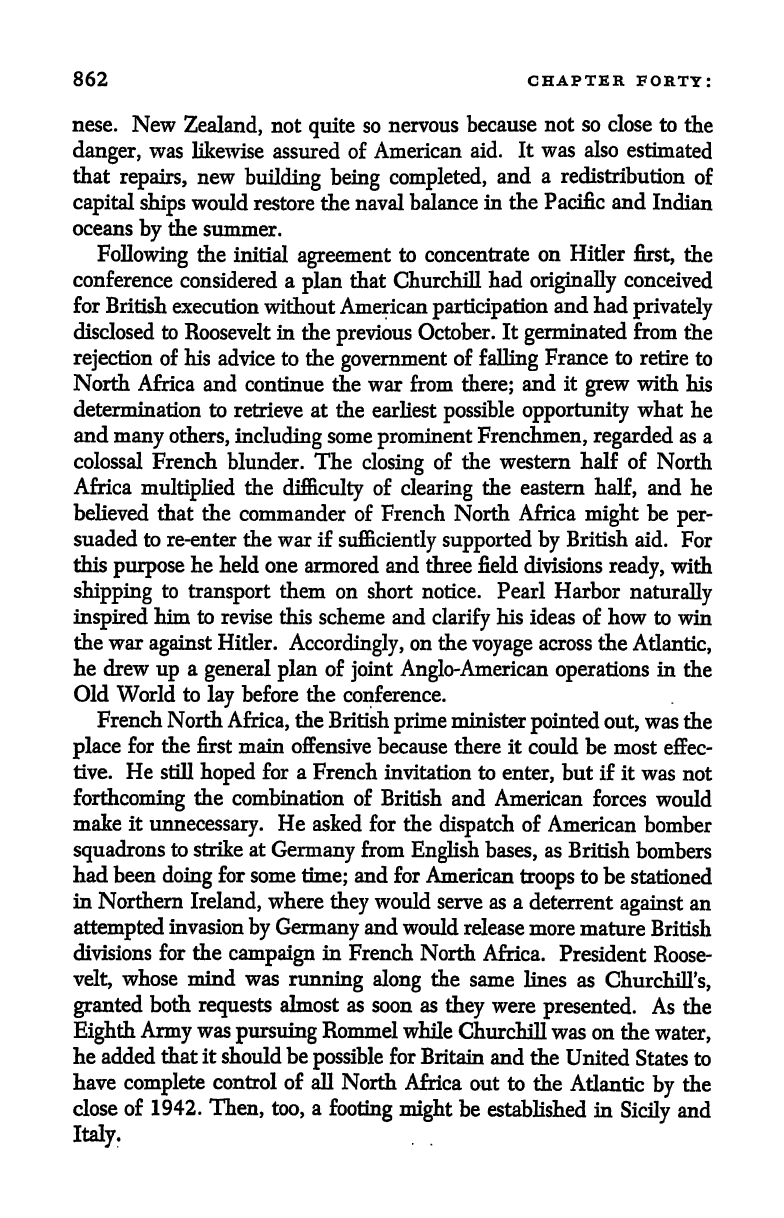
862
CHAPTER
FORTY:
nese.
New
Zealand,
not
quite
so
nervous
because
not
so close
to
the
danger,
was
likewise
assured
of
American
aid.
It
was
also
estimated
that
repairs,
new
building being
completed,
and
a
redistribution
of
capital
ships
would restore the
naval
balance
in
the
Pacific
and
Indian
oceans
by
the
summer.
Following
the
initial
agreement
to
concentrate
on
Hitler
first,
the
conference
considered
a
plan
that
Churchill
had
originally
conceived
for
British
execution
without
American
participation
and had
privately
disclosed to
Roosevelt in
the
previous
October.
It
germinated
from
the
rejection
of his
advice to the
government
of
falling
France to
retire
to
North
Africa
and continue the war
from
there;
and
it
grew
with
his
determination
to
retrieve
at
the
earliest
possible
opportunity
what
he
and
many
others,
including
some
prominent
Frenchmen,
regarded
as
a
colossal French
blunder. The
closing
of the
western half of
North
Africa
multiplied
the
difficulty
of
clearing
the
eastern
half,
and
he
believed that the
commander of
French
North
Africa
might
be
per-
suaded
to
re-enter
the war if
sufficiently
supported
by
British
aid.
For
this
purpose
he
held one
armored
and
three field divisions
ready,
with
shipping
to
transport
them
on short
notice.
Pearl Harbor
naturally
inspired
him to
revise this scheme
and
clarify
his
ideas
of
how
to
win
the war
against
Hitler.
Accordingly,
on
the
voyage
across
the
Atlantic,
he
drew
up
a
general
plan
of
joint
Anglo-American
operations
in
the
Old
World
to
lay
before
the
conference.
French
North
Africa,
the British
prime
minister
pointed
out,
was
the
place
for tie
first main
offensive
because
there
it could
be most
effec-
tive.
He
still
hoped
for
a
French
invitation
to
enter,
but if it
was
not
forthcoming
the
combination of
British
and
American
forces
would
make it
unnecessary.
He
asked for the
dispatch
of
American
bomber
squadrons
to
strike
at
Germany
from
English
bases,
as
British
bombers
had
been
doing
for
some
time;
and for
American
troops
to be
stationed
in Northern
Ireland,
where
they
would serve
as
a
deterrent
against
an
attempted
invasion
by
Germany
and
would
release more
mature
British
divisions
for the
campaign
in
French
North
Africa.
President
Roose-
velt,
whose
mind
was
running along
the same
lines
as
Churchill's,
granted
both
requests
almost as
soon as
they
were
presented.
As
the
Eighth
Army
was
pursuing
Rommel
while
Churchill was on
the
water,
he
added
that
it
should be
possible
for
Britain
and the
United
States to
have
complete
control of
all
North
Africa
out
to the
Atlantic
by
the
close
of
1942.
Then,
too,
a
footing
might
be
established
in
Sicily
and
Italy.
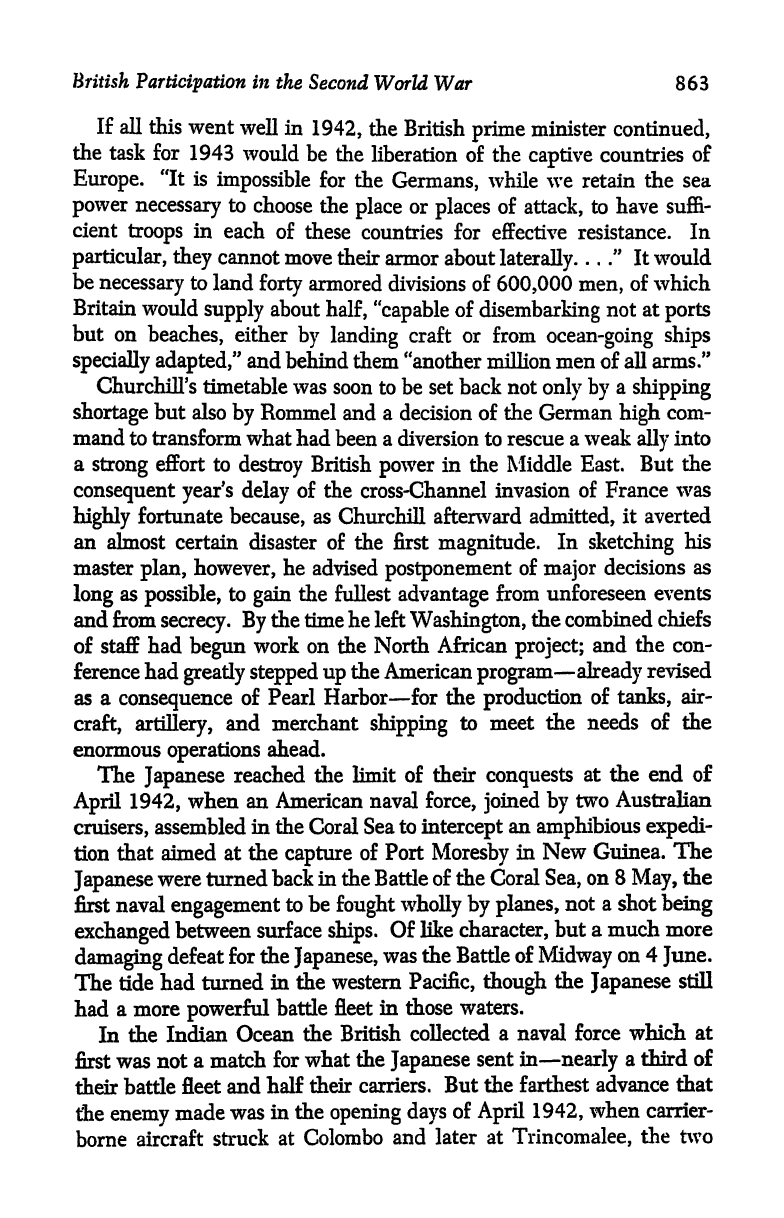
British
Participation
in
the
Second
World
War
863
If
all this went
well in
1942,
the British
prime
minister
continued,
the task
for
1943
would
be
the
liberation
of
the
captive
countries
of
Europe.
"It
is
impossible
for the
Germans,
while
\ve
retain
the
sea
power
necessary
to
choose
the
place
or
places
of
attack,
to
have suffi-
cient
troops
in
each
of
these
countries for
effective
resistance.
In
particular,
they
cannot move
their
armor about
laterally
"
It
would
be
necessary
to
land
forty
armored
divisions of
600,000
men,
of
which
Britain
would
supply
about
half,
"capable
of
disembarking
not
at
ports
but
on
beaches,
either
by
landing
craft
or
from
ocean-going
ships
specially adapted,"
and
behind them
"another million
men of all
arms."
Churchill's
timetable was
soon
to be
set
back not
only
by
a
shipping
shortage
but also
by
Rommel
and
a
decision
of the
German
high
com-
mand to
transform what had
been
a
diversion to rescue
a
weak
ally
into
a
strong
effort
to
destroy
British
power
in the
Middle
East.
But the
consequent
year's delay
of the
cross-Channel
invasion
of
France
was
highly
fortunate
because,
as
Churchill
afterward
admitted,
it averted
an
almost
certain
disaster of the
first
magnitude.
In
sketching
his
master
plan,
however,
he advised
postponement
of
major
decisions
as
long
as
possible,
to
gain
the fullest
advantage
from
unforeseen
events
and from
secrecy.
By
the
time he left
Washington,
the
combined
chiefs
of staff had
begun
work on
the
North
African
project;
and
the
con-
ference had
greatly stepped
up
the American
program
already
revised
as a
consequence
of Pearl Harbor
for the
production
of
tanks,
air-
craft,
artillery,
and
merchant
shipping
to meet
the
needs of
the
enormous
operations
ahead.
The
Japanese
reached the
limit of
their
conquests
at the
end
of
April
1942,
when an American naval
force,
joined
by
two
Australian
cruisers,
assembled
in
the
Coral
Sea
to
intercept
an
amphibious
expedi-
tion
that
aimed
at the
capture
of Port
Moresby
in
New Guinea.
The
Japanese
were turned
back
in the Battle of
the Coral
Sea,
on
8
May,
the
first
naval
engagement
to
be
fought
wholly
by planes,
not
a
shot
being
exchanged
between
surface
ships.
Of like
character,
but
a much
more
damaging
defeat
for
the
Japanese,
was
the Battle of
Midway
on
4
June.
The
tide
had turned
in the
western
Pacific,
though
the
Japanese
still
had
a
more
powerful
battle
fleet
in
those
waters.
In
the
Indian
Ocean
the British
collected
a
naval
force which
at
first
was not
a
match
for
what
the
Japanese
sent
in
nearly
a third of
their
battle
fleet
and
half
their
carriers.
But
the
farthest advance
that
the
enemy
made
was
in
the
opening
days
of
April
1942,
when carrier-
borne
aircraft
struck
at Colombo
and later
at
Trincomalee,
the two
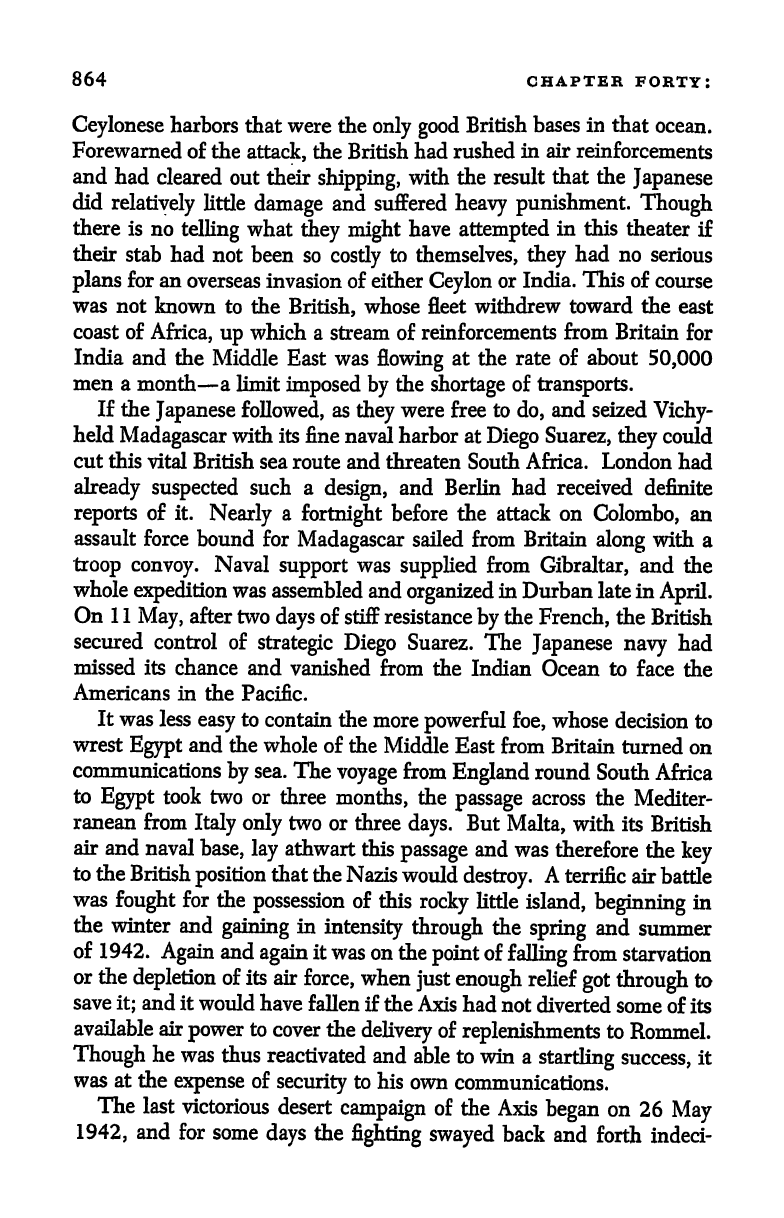
864
CHAPTER
FORTY:
Ceylonese
harbors that
were
the
only good
British
bases in
that
ocean.
Forewarned of the
attack,
the British
had
rushed
in air
reinforcements
and
had
cleared
out
their
shipping,
with the result
that
the
Japanese
did
relatively
little
damage
and
suffered
heavy
punishment.
Though
there
is
no
telling
what
they
might
have
attempted
in this
theater
if
their
stab had
not been
so
costly
to
themselves,
they
had no
serious
plans
for an
overseas
invasion
of
either
Ceylon
or
India.
This
of
course
was not
known
to the
British,
whose fleet
withdrew toward the
east
coast of
Africa,
up
which
a
stream of
reinforcements
from
Britain
for
India
and
the Middle East was
flowing
at
the
rate of
about
50,000
men a
month a
limit
imposed by
the
shortage
of
transports.
If the
Japanese
followed,
as
they
were
free to
do,
and seized
Vichy-
held
Madagascar
with
its fine
naval harbor
at
Diego
Suarez,
they
could
cut
this
vital British sea
route and threaten South
Africa.
London
had
already suspected
such
a
design,
and
Berlin
had received
definite
reports
of it.
Nearly
a
fortnight
before
the attack on
Colombo,
an
assault
force
bound for
Madagascar
sailed from
Britain
along
with
a
troop
convoy.
Naval
support
was
supplied
from
Gibraltar,
and
the
whole
expedition
was
assembled
and
organized
in
Durban
late in
April.
On
1 1
May,
after
two
days
of
stiff
resistance
by
the
French,
the
British
secured
control of
strategic
Diego
Suarez. The
Japanese
navy
had
missed its
chance
and
vanished
from
the
Indian
Ocean to
face
the
Americans
in the
Pacific.
It was
less
easy
to
contain
the
more
powerful
foe,
whose
decision to
wrest
Egypt
and the
whole of
the
Middle
East
from Britain
turned
on
communications
by
sea.
The
voyage
from
England
round South
Africa
to
Egypt
took two or
three
months,
the
passage
across
the
Mediter-
ranean
from
Italy
only
two
or three
days.
But
Malta,
with
its
British
air
and naval
base,
lay
athwart this
passage
and was
therefore
the
key
to
the
British
position
that
the
Nazis
would
destroy.
A
terrific
air
battle
was
fought
for the
possession
of this
rocky
little
island,
beginning
in
the
winter
and
gaining
in
intensity
through
the
spring
and
summer
of 1942.
Again
and
again
it
was on the
point
of
falling
from
starvation
or the
depletion
of its air
force,
when
just
enough
relief
got
through
to
save
it;
and it
would
have
fallen
if
the Axis
had
not
diverted
some
of its
available air
power
to cover
the
delivery
of
replenishments
to
Rommel.
Though
he
was
thus
reactivated
and
able to
win a
startling
success,
it
was at
the
expense
of
security
to his
own
communications.
The
last
victorious
desert
campaign
of the
Axis
began
on
26
May
1942,
and
for some
days
the
fighting
swayed
back
and
forth
indeci-
